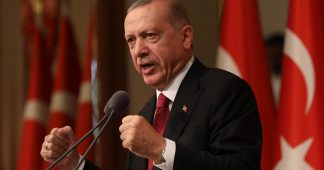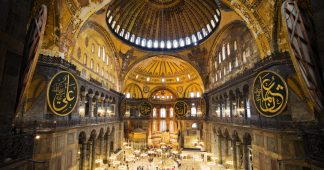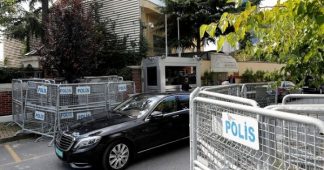By Qosai Amameh and Tom Rollins
23 July 2019
urkey is deporting Syrians from Istanbul to Syria, including to the volatile northwest province of Idlib, according to people who have been the target of a campaign launched last week against migrants who lack residency papers.
The crackdown comes at a time of rising rhetoric and political pressure on the country’s 3.6 million registered Syrian refugees to return home. Estimates place hundreds of thousands of unregistered Syrians in Turkey, many living in urban areas such as Istanbul.
Refugee rights advocates say deportations to Syria violate customary international law, which prohibits forcing people to return to a country where they are still likely to face persecution or risk to their lives.
Arrests reportedly began as early as 13 July, with police officers conducting spot-checks in public spaces, factories, and metro stations around Istanbul and raiding apartments by 16 July. As word spread quickly in Istanbul’s Syrian community, many people shut themselves up at home rather than risk being caught outside.
It is not clear how many people have been deported so far, with reported numbers ranging from hundreds to a thousand.
“Deportation of Syrians to their country, which is still in the midst of armed conflict, is a clear violation of both Turkish and international law.”
Turkey’s Ministry of Interior has said the arrests are aimed at people living without legal status in the country’s most populous city. Istanbul authorities said in a Monday statement that only “irregular migrants entering our country illegally [will be] arrested and deported.” It added that Syrians registered outside Istanbul would be obliged to return to the provinces where they were first issued residency.
Mayser Hadid, a Syrian lawyer who runs a law practice catering to Syrians in Istanbul, said that the “deportation of Syrians to their country, which is still in the midst of armed conflict, is a clear violation of both Turkish and international law,” including the “return of Syrians without temporary protection cards.”
Istanbul authorities maintain that the recent detentions and deportations are within the law.
Starting in 2014, Syrian refugees in Turkey have been registered under “temporary protection” status, which grants the equivalency of legal residency and lets holders apply for a work permit. Those with temporary protection need special permission to work or travel outside of the area where they first applied for protection.
But last year, several cities across the country – including Istanbul – stopped registering newly-arrived Syrians.
In the Monday statement, Istanbul authorities said that Syrians registered outside of the city must return to their original city of registration by 20 August. They did not specify the penalty for those who do not.
Barely 24 hours after the beginning of raids last week, Muhammad, a 21-year-old from Eastern Ghouta in Syria, was arrested at home along with his Syrian flatmates in the Istanbul suburb of Esenler.
Muhammad, who spoke by phone on the condition of anonymity for security reasons – as did all Syrian deportees and their relatives interviewed for this article – said that Turkish police officers had forced their way into the building. “They beat me,” he said. “I wasn’t even allowed to take anything with me.”
Muhammad said that as a relatively recent arrival, he couldn’t register for temporary protection and had opted to live and work in Istanbul without papers.
After his arrest, Muhammad said, he was handcuffed and bundled into a police van, and transferred to a detention facility on the eastern outskirts of the city.
There, he said, he was forced to sign a document written in Turkish that he couldn’t understand and on Friday was deported to Syria’s Idlib province, via the Bab al-Hawa border crossing.
Deportation to Idlib
Government supporters say that Syrians have been deported only to the rebel-held areas of northern Aleppo, where the Turkish army maintains a presence alongside groups that it backs.
A representative from Istanbul’s provincial government office did not respond to a request for comment, but Youssef Kataboglu, a pro-government commentator who is regarded as close to the government, said that “Turkey only deports Syrians to safe areas according to the law.”
He denied that Syrians had been returned to Idlib, where a Syrian government offensive that began in late April kicked off an upsurge in fighting, killing more than 400 civilians and forcing more than 330,000 people to flee their homes. The UN said on Monday alone, 59 civilians were killed, including 39 when a market was hit by airstrikes.
Kataboglu said that deportation to Idlib would “be impossible.”
Mazen Alloush, a representative of the border authorities on the Syrian side of the Bab al-Hawa crossing that links Turkey with Idlib, said that more than 3,800 Syrians had entered the country via Bab al-Hawa in the past fortnight, a number he said was not a significant change from how many people usually cross the border each month.
The crossing is controlled by rebel authorities affiliated to Tahrir a-Sham, the hardline Islamist faction that controls most of Idlib.
“A large number of them were Syrians trying to enter Turkish territory illegally,” who were caught and forced back across, Alloush said, but also “those who committed offences in Turkey or requested to return voluntarily.”
“We later found out that he’d been deported to Idlib.”
He added that “if the Turkish authorities are deporting [Syrians] through informal crossings or crossings other than Bab al-Hawa, I don’t have information about it.”
Other Syrians caught up in the crackdown, including those who did have the proper papers to live and work in Istanbul, confirmed that they had been sent to Idlib or elsewhere.
On July 19, Umm Khaled’s son left the family’s home without taking the documents that confirm his temporary protection status, she said. He was stopped in the street by police officers.
“They [the police] took him,” Umm Khaled, a refugee in her 50s originally from the southern Damascus suburbs, said by phone. “We later found out that he’d been deported to Idlib.”
Rami, a 23-year-old originally from eastern Syria’s Deir Ezzor province, said he was deported from Istanbul last week. He was carrying his temporary protection status card at the time of his arrest, he added.
“I was in the street in Esenler when the police stopped me and asked for my identity card,” he recalled in a phone conversation from inside Syria. “They checked it, and then asked me to get on a bus.”
Several young Syrian men already on board the bus were also carrying protection documents with them, Rami said.
“The police tied our hands together with plastic cords,” he added, describing how the men were then driven to a nearby police station and forced to give fingerprints and sign return documents.
Rami said he was later sent to northern Aleppo province.
Rising anti-Syrian sentiment
The country has deported Syrians before, and Human Rights Watch and other organisations have reported that Turkish security forces regularly intercept and return Syrian refugees attempting to enter the country. As conflict rages in and around Idlib, an increasing number of people are still trying to get into Turkey.
Turkey said late last year that more than 300,000 Syrians have returned to their home country voluntarily.
A failed coup attempt against President Recep Tayyip Erdoğan in July 2016 led to an emergency decree that human rights groups say was used to arrest individuals whom the government perceived as opponents. Parts of that decree were later passed into law, making it easier for authorities to deport foreigners on the grounds that they are either linked to terrorist groups or pose a threat to public order.
The newest wave of deportations after months of growing anti-Syrian sentiment in political debate and on the streets has raised more questions about how this law might be used, as well as the future of Syrian refugees in Turkey.
In two rounds of mayoral elections that ended last month with a defeat for Erdoğan’s ruling Justice and Development Party (AKP), the winning candidate, Ekrem İmamoğlu of the Republican People’s Party (CHP), repeatedly used anti-Syrian rhetoric in his campaign, capitalising on discontent towards the faltering economy and the increasingly contentious presence of millions of Syrian refugees.
Shortly after the elections, several incidents of mob violence against Syrian-owned businesses took place. Widespread anti-Syrian sentiment has also been evident across social media; after the mayoral election trending hashtags on Twitter reportedly included “Syrians get out”.
As the deportations continue, the families of those sent back are wondering what they can do.
“By God, what did he do [wrong]?” asked Umm Khaled, speaking of her son, now in war-torn Idlib.
“His mother, father, and all his sisters are living here legally in Turkey,” she said. “What are we supposed to do now?”
(TOP PHOTO: Syrian refugees look over Istanbul, August 2014.)
Published at https://www.thenewhumanitarian.org/news/2019/07/23/syrians-istanbul-fears-rise-deportations-begin











